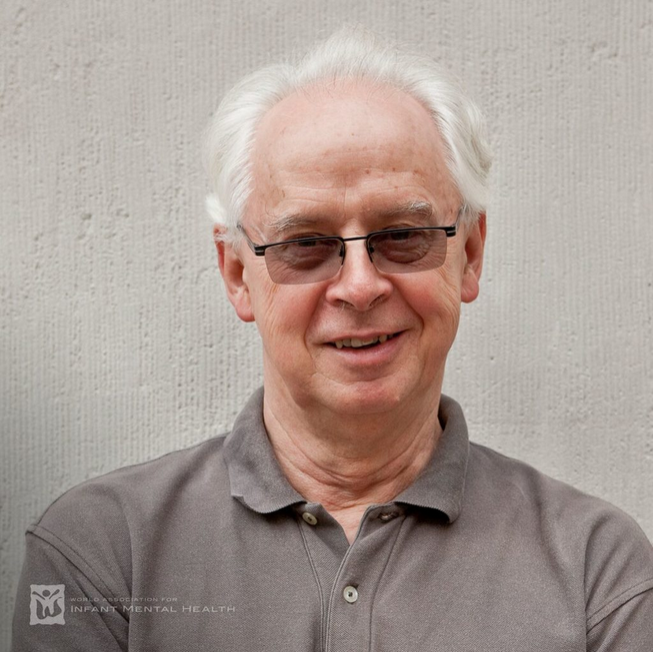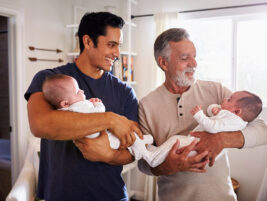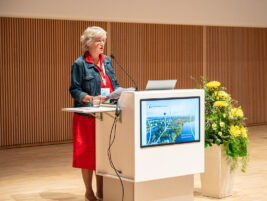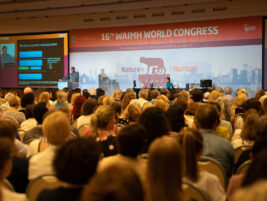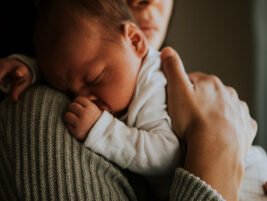Dear colleagues and friends,
As I sit here at my desk in Naarm (Melbourne), looking out the window I see the wattle birds in the ancient Bulgalla trees (Banksia) in our front garden gathering nectar from the flowers and singing loudly. I sit here and realise how fortunate many of us here in Australia can be, but how stressed and terrified will be many infants, children, and families around the world. I and a vast number of other Australians were disappointed that a recent referendum to endorse a Voice to Parliament for our First Nations people was not adopted. Those of us working with infants and families will continue to stress the importance of giving voice to communities such as our First Nations Peoples who were deprived of so much because of colonialist invasion.
As you know, at this moment, the world has more children displaced from their homes by war, natural disaster and conflict, living as refugees and displaced persons, than there have been at any time in history. Indeed, there have always been wars and natural disasters. International and local relief organisations have been overwhelmed with needs, in their support of children and families. In what ways has humankind continued to ethically develop?
The unfolding humanitarian catastrophe in the Middle East is a profound challenge for world leaders and us all. The Israeli military response to the horrific terrorist Hamas acts of killing and kidnapping has led to immense destruction in Gaza with a horrific and ongoing number of civilian deaths, including infants, and the destruction of homes and infrastructure.
It is extremely distressing to see what unfolds around us and we may feel that there may be little we can do. Regarding the war in Gaza, one particular response from WAIMH has been to support colleagues in Palestine in developing and delivering emotional and mental health first aid to parents of preschoolers. This will happen very early in 2024. Ghassan Abdullah and colleagues in the Palestinian Territories, with WAIMH support and with international colleagues, are currently developing a program for training early childhood workers to work with parents and very young children in the conflict zones. Dr Abdullah, working with Care International Palestine, has been a powerful advocate for mental health interventions for infants and young children amid this conflict. We anticipate that this will enable similar programs to be delivered for infants, preschoolers, and their families throughout the war zone and elsewhere where needed. We continue to work as an independent, nonpolitical international organisation, to support our colleagues in the work that they do for infants and families in all communities. The need for emotional recovery for children and families across this region is going to be immense.
WAIMH also wrote to the Director-General of the International Red Cross regarding the welfare and whereabouts of infants, young children and their families, as well as others, who have been brutally taken hostage by Hamas. The Director-General, Robert Mardini, replied, emphasising that the welfare of hostages in this situation remains their imperative and priority and that the International Committee of the Red Cross will continue to work intensively towards their safety and release, as well as meeting in Israel with the families of hostages.
We are in touch with our Israeli Affiliate president, past president, colleagues and affiliate members, who are providing interventions for infants and young children survivors and their families from the initial terrorist Hamas attack. The impact upon children of witnessing acts of inhuman violence and their separation from parents and loved ones is one of the most grotesque consequences of human conflict.
A huge challenge for us all is to see what we can do, as members of WAIMH, in the aftermath of major catastrophes, conflict and war, to ensure that our infants and young children are still able to develop with a sense of hope and positive moral strength. Infants and young children are watching intently, aware of and responding to our responses to trauma and how we handle the fragmentation of moral behaviour. We know that not everyone exposed to major traumatic events goes on to develop ongoing post-traumatic stress disorder. How can we identify the strengths in the parent-infant relationship which might enable the infant experiencing profound trauma to keep on a journey towards emotional health rather than disintegration? We know the importance of play, of lively interaction between infant and parent in the development of a strong sense of self.
What determines and influences the healthy emotional and moral development of infants in the face of profound adversity? The late Bob Emde, always a thoughtful and creative thinker, addressed some of these questions in his writings about the moral development of infants (Emde, 2016). Bob reminded us of the roots of morality in human development and in addition to reciprocity and empathy he added the important concept of valuation as a third function of human morality. The immense body of research looking at early infant-parent interactions tells us a lot about how babies, toddlers, and young children learn about the value of the other, and the internalisation of ethical conduct from the very beginning. Infants know about the “do’s” and “don’ts” of conduct (Emde, 2016). Can we use these concepts to help infants and families caught in human catastrophe?
As WAIMH members, I believe it is important to continue to identify the moral strengths of infants and families and advocate for further deep understanding of the emotional and inner world of the child in the face of trauma. Each of you is doing something of this work in your own clinical, research, or teaching capacity to help build emotional safety for infants in the face of trauma and disruption.
Sustaining our capacity
Our regular WAIMH congress is one very important way of sustaining our capacity for curiosity, learning, and creativity in working with extremely traumatised infants and families. I believe that the upcoming WAIMH Interim Congress in June 2024, in Tampere, will be an important opportunity for us to meet up in person to talk through some of these crucial dilemmas.
WAIMH Interim World Congress will take place on 5-7 June 2024 at the Tampere Hall in Tampere, Finland, with the theme “Looking for the best care for babies, young children, and families”.
We invite you to present your thoughts and work through the medium of lively interactive poster presentations which will be during the lunch and break periods. We welcome any poster presentations which are relevant to the lives and mental health of infants and parents, and our work in many diverse ways with them.
We have several specific and important themes:
- Equity, Diversity, and Inclusion (EDI)
- Infants, Young Children and Families of First Nations Peoples
- Infants in Crisis Situations
- Nordic Services in Infant Mental Health, and
- Opportunities for posters from any other perspective of work with infants and families (See the Congress flyer at the end of this issue of Perspectives).
We will have a Pre-Congress day which will illustrate some of the innovative approaches to the care of very young children from amongst the Nordic countries. Again, another opportunity for lively engaged discussion about infants, culture, and regional history.
Our WAIMH Affiliates will be able to join together in person and online for an Affiliate meeting during the Congress.
So please feel inspired to contribute your work as a poster for discussion with your colleagues in Tampere.
WAIMH is also committed to supporting further training in infant and parent mental health colleagues across many countries, cultures, and political and socio-economic circumstances. The series of online webinars, “Laying the Path for Lifelong Wellness-Infant and Early Mental Health”, in collaboration with Infant Early Mental Health Promotion, Sick Kids Toronto, remains available for members and all those interested in infant mental health.
One of the key positive consequences of the COVID pandemic amidst the loss of life, and disruption of economic productivity, has been our capacity to communicate through the medium of Internet conferencing. The WAIMH hybrid Congress in Brisbane was one example, and our ongoing engagement with WAIMH working groups is another. Internet conferencing has enabled powerful creative connections between WAIMH members and others.
The Global Crisis Working Group under the direction of Astrid Berg is busy linking in supporting IMH and psychotherapy clinicians across many different countries.
At our recent Executive Committee meeting we were pleased to endorse other special working groups for developing the issues of:
- Ethics in Infant Mental Health
- Early Childhood and Digital Device Use, and
- Equity, Diversity, and Inclusion for IMH service delivery, research, and publications.
With the leadership of Maree Foley, Jane Barlow, assistant editor Salisha Maharaj, and several associate editors, our Perspectives in Infant Mental Health online journal is going from strength to strength. It is a crucial way that we can communicate quickly and effectively with members and the broader community about developments in infant mental health.
We welcome your contributions to supporting infants, their families, and societies who are in crisis. We welcome your thoughts and observations as they relate to infants and young children. We welcome your epidemiological studies and your creative interventions across all levels within our field of infant mental health.
This Congress will be an important opportunity for us to meet up, talk together, share our thoughts, ideas, feelings, our distress, and plan more to deliver the best outcomes for troubled infants, families, and their communities.
So again, I look forward to meeting up with you in person in Tampere (our Sixth World WAIMH Congress was held in Tampere in 1996 under the leadership of Tuula Tamminen and Kaija Puura!). The Finns provide wonderful hospitality and in June, almost unending sunlight. With our various working groups, regional meetings, and our online Perspectives in Infant Mental Health Journal.
Wishing you all safety and happiness during the holiday season and a creative and productive New Year.
Campbell Paul (President of WAIMH)
Reference
Emde, R. N. (2016). From a baby smiling: Reflections on virtues in development. In J. Annas, D. Narvaez, & N. E. Snow (Eds.), Developing the virtues: Integrating perspectives (pp. 69–94). Oxford University Press. https://doi.org/10.1093/acprof:oso/9780190271466.003.0004
Authors
Campbell Paul, Melbourne, Australia
President of WAIMH, Associate Professor, Royal Children’s Hospital Melbourne, University of Melbourne, Murdoch Children’s Research Centre


